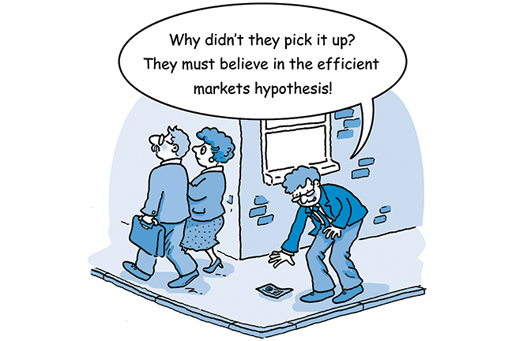3.4 Understanding the efficient markets hypothesis
As financial markets have grown, and as regulatory and information barriers to arbitrage and short-selling have fallen away, economists have been more confident about the efficiency of markets. This greater informational efficiency has led some theorists to go as far as supporting the efficient markets hypothesis (EMH).
The EMH states that market outcomes (the prices set and the volumes traded) are efficient in the sense of immediately and accurately incorporating all relevant information. There are different versions of the EMH, each with striking implications for the behaviour of market prices and for appropriate investment strategy.
A weak form of the EMH acknowledges that traders may not be able to obtain or process all publicly available information, and that current prices only contain all the information conveyed by prices in the past. This form denies the effectiveness of technical analysis, by which some investors study past patterns of price movement and look for signs of their repetition that will indicate the next price movement. If all information from past prices is already priced-in, any apparent patterns will have arisen by chance and cannot be expected to recur.
The semi-strong form of the EMH holds that prices contain all relevant publicly available information, but leaves open the possibility of some traders gaining an advantage through inside information. This form denies the effectiveness of fundamental analysis, by which some investors study published information on the issuers of shares and bonds, and on commodities, to identify those that are underpriced and can be expected to rise in price. If the market price already reflects this publicly available information, there will not be undervalued or overvalued instruments as the fundamental analysts assume.
The strong form of the EMH holds that market prices contain all relevant information. This includes inside information held by a small number of market players, as well as information publicly available to all, such as business and economic news and published company accounts. It is assumed that people holding privileged information will, through their trading behaviour, cause it quickly to be captured in the price, which then transmits the information to everyone.
The type of information that is relevant to the EMH depends on what model of asset price determination is being used. For example, if this is the dividend valuation model, as used in fundamental analysis (see Shares – more on when they are good value [Tip: hold Ctrl and click a link to open it in a new tab. (Hide tip)] ), the model will incorporate all relevant information regarding the expected earnings of a company. So prices will only move on the arrival of genuinely new information that changes the assessment of these earnings. The impact of this news and the direction of price movement will not be predictable, otherwise those who predicted it would already have carried out trades that incorporate the information into the price.

